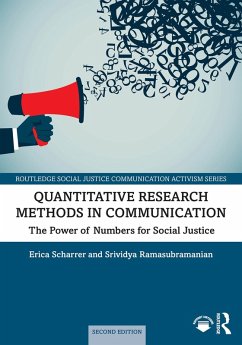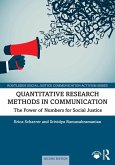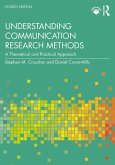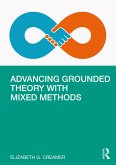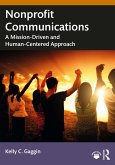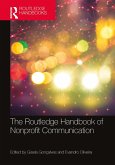Providing both inspiration and step-by-step guidance on how to conceive, design, and carry out a quantitative study, the book shows how research can be used to work toward a more just and equitable world. The authors provide a detailed guide to quantitative methods and statistical analysis, showing how researchers can engage with social justice issues in systematic, rigorous, ethical, and meaningful ways. This new edition includes a new chapter on writing literature reviews and better aligns with the stages of quantitative research as well as the changing technologies that are available for researchers to both study and use in their work. It includes updated real-world case studies, interviews with scholar-activists, and definitions of key concepts as well as a deeper focus on ethics, social media, computational social sciences, data analytics, and data visualization techniques.
Attuned to questions of access, equity, justice, diversity, and inclusion, this textbook is ideal for graduate and advanced undergraduate courses in research methods for communication and the social sciences. It will also be of interest to researchers who wish to engage with the transformation of structures, practices, and understandings in society through community and civic engagement and policy formation.
Online resources for instructors include a test bank, PowerPoint slides, sample dataset, and YouTube tutorials. They are available online at www.routledge.com/9781032599878.
Dieser Download kann aus rechtlichen Gründen nur mit Rechnungsadresse in A, B, BG, CY, CZ, D, DK, EW, E, FIN, F, GR, HR, H, IRL, I, LT, L, LR, M, NL, PL, P, R, S, SLO, SK ausgeliefert werden.
"This isn't your father's methods text, and that's a good thing. If you're focused on social justice and suspicious of quantitative methods, this book will show you how quantitative, mixed, and qualitative methods can-and should-all be marshalled to address the important questions we face today. This is an introduction to quantitative research design and execution that successfully engages with societal problems without sacrificing any of the nuance and precision expected from a first-rate textbook." -Larry Gross, Professor, University of Southern California
"This is not just another stats book! Scholarly yet accessible and practical, Scharrer and Ramasubramanian critique the misuse of numbers and, more importantly, show us how to harness the power of numbers for social justice. This is a book that many in our field have been waiting for." -Sonia Livingstone, London School of Economics and Political Science
"In covering the nuts and bolts of quantitative research methods while showing why and how research matters for society, this book is a tremendously valuable resource for students and scholars in Communication and across the social sciences."-Dana Mastro, Associate Dean of the College of Creative Studies and Professor of Communication, University of California, Santa Barbara
Mary Beth Oliver, Pennsylvania State University, USA
"Social justice issues arise at every stage of research, from the initial literature review through to critically harnessing the power of numbers and then, communicating the results for social good. Scharrer and Ramasubramanian provide the essential guide that both novice and expert researchers need."
Sonia Livingstone, London School of Economics and Political Science, UK

